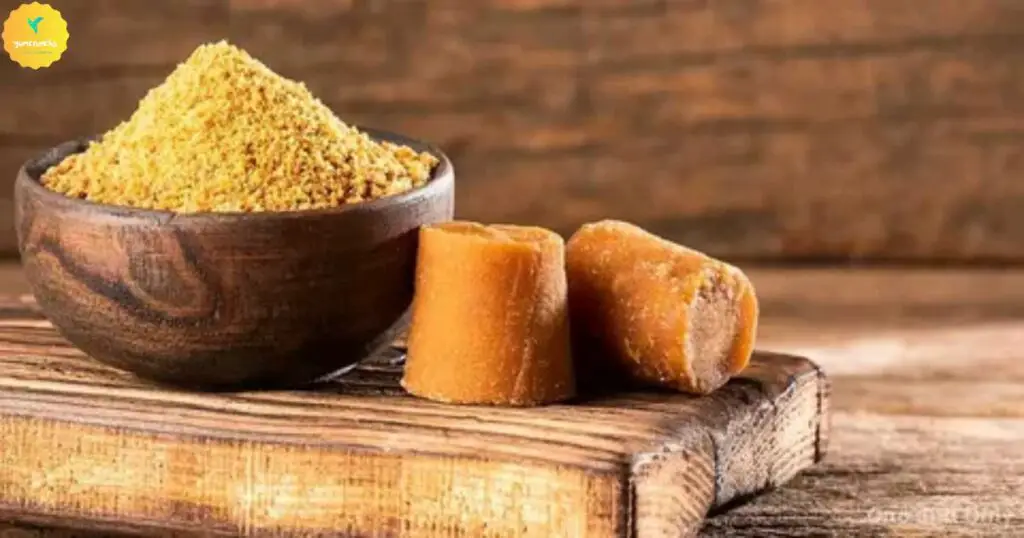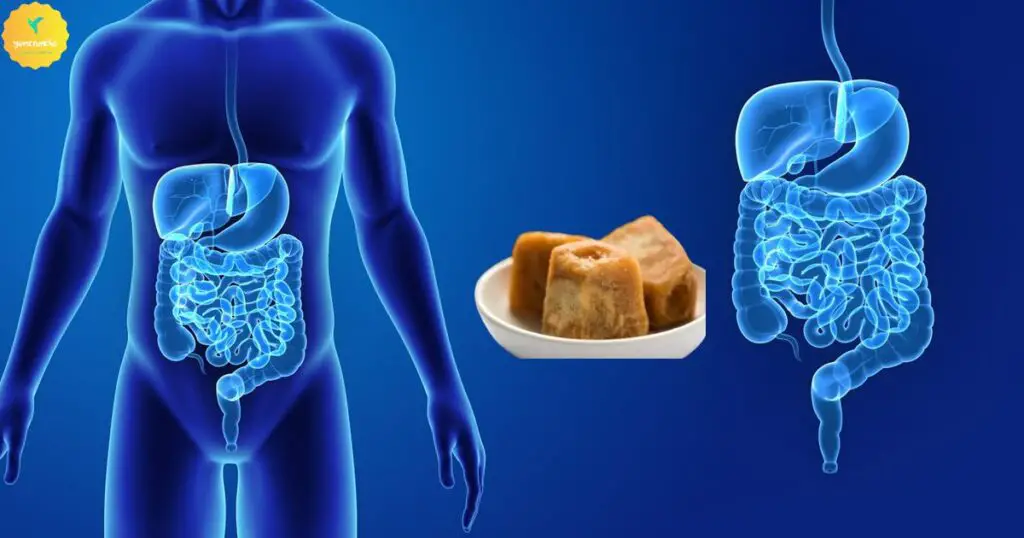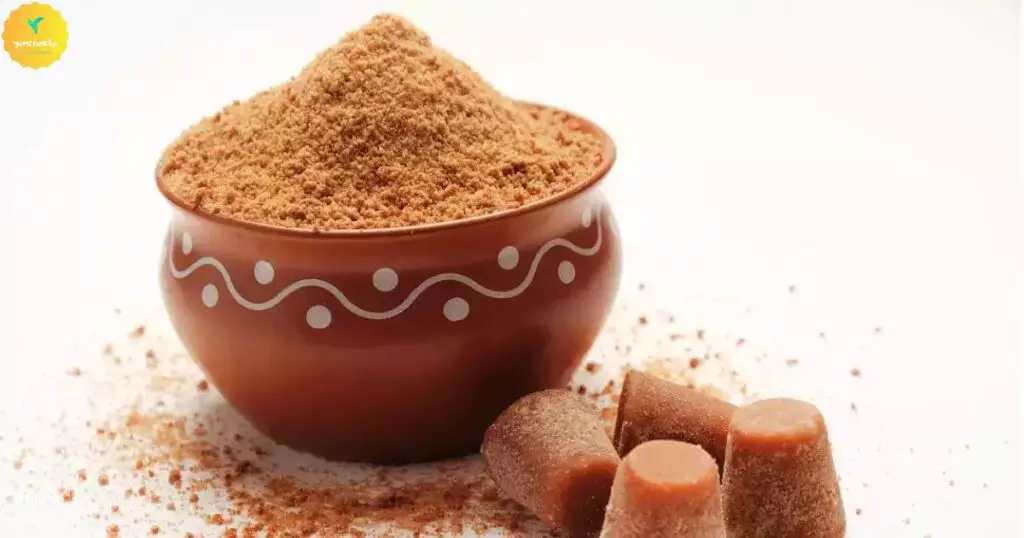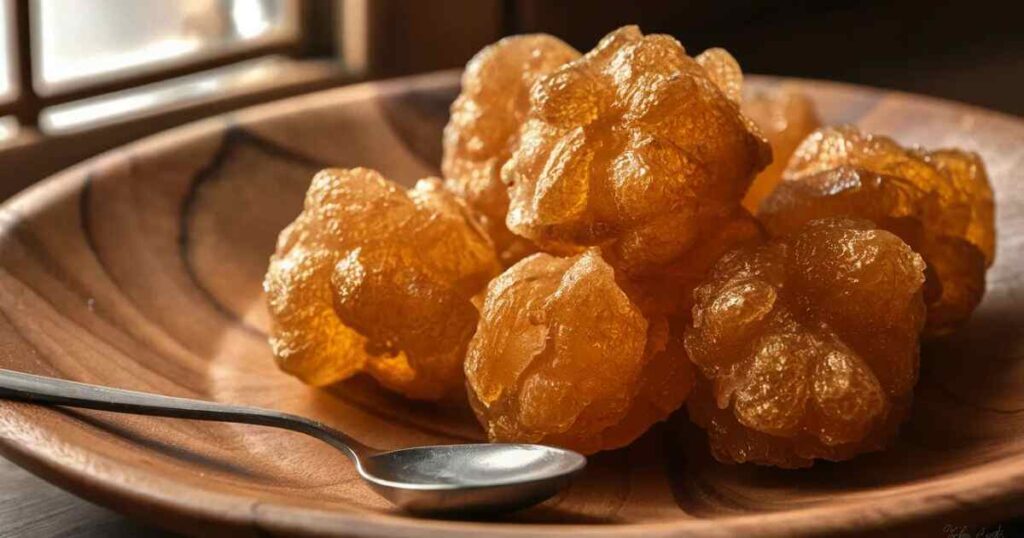Jiggery, often known as “Gur” in India, is a traditional unrefined sugar made from sugarcane or palm sap. This natural sweetener is rich in vitamins and minerals, making it a healthier alternative to refined sugar. At Wellhealthorganic.com, we explore the numerous health benefits jaggery offers, from boosting immunity to aiding digestion.
Have you ever wondered how a simple sweetener could hold the key to numerous health benefits? Jaggery is not just a sugar substitute; it is a powerhouse of nutrients. Imagine adding a sweet touch to your diet while simultaneously enhancing your health. Isn’t it intriguing to think that such a humble ingredient can play such a significant role in your well-being?
Jaggery is packed with essential nutrients like iron, magnesium, and potassium. It helps in cleansing the liver by flushing out harmful toxins and is known to improve digestive health by aiding in the secretion of digestive enzymes. Regular consumption of jaggery can also help combat anemia by increasing hemoglobin levels, making it an excellent dietary addition for maintaining overall health.
What is jaggery?
Jaggery is a natural sweetener made from sugarcane juice or palm sap. Unlike refined sugar, which goes through a chemical process, jaggery is produced by boiling the juice until it solidifies. This traditional method preserves many nutrients, making jaggery a healthier choice.
Rich in vitamins and minerals, jaggery is not only a sweet treat but also a nutritional powerhouse. It contains iron, magnesium, potassium, and antioxidants. These nutrients help boost energy, improve digestion, and support overall health, making jaggery a beneficial addition to your diet.
Nutritional Profile of Jaggery
Jaggery, also known as “Gur” in India, is a traditional, unrefined sugar made from sugarcane juice or palm sap. CAN DOGS TASTE SPICY FOOD? It is widely used in various cuisines and traditional medicines, particularly in South Asia. Unlike refined sugar, jaggery retains a substantial amount of the molasses content during processing, which contributes to its distinct flavor and nutritional profile.
Nutritional Composition
Macronutrients
- Carbohydrates: Jaggery is predominantly composed of carbohydrates, mainly sucrose (65-85%), with smaller amounts of glucose and fructose. This high carbohydrate content makes it a quick source of energy.
- Proteins and Fats: Jaggery contains negligible amounts of protein and fat. It is primarily a source of energy rather than other macronutrients.
Micronutrients
- Vitamins: Jaggery contains trace amounts of several vitamins, particularly from the B-complex group, including vitamin B1 (thiamine), vitamin B2 (riboflavin), and vitamin B3 (niacin). These vitamins are essential for energy metabolism and overall cellular function.
- Minerals: One of the significant nutritional advantages of jaggery over refined sugar is its mineral content. It is a rich source of:
- Iron: Jaggery is especially noted for its iron content, making it beneficial for individuals with iron-deficiency anemia. The iron is derived from the traditional processing equipment.
- Calcium: This mineral is essential for bone health and various metabolic functions.
- Magnesium: Important for muscle function, nerve function, and maintaining a healthy immune system.
- Potassium: Helps in maintaining electrolyte balance, muscle contractions, and nerve signals.
- Phosphorus: Plays a role in the formation of bones and teeth and is involved in energy production.
- Trace Minerals: Jaggery also contains small amounts of zinc, copper, and manganese, contributing to its antioxidant properties and overall health benefits.
Health Benefits
- Digestive Health: Jaggery aids digestion by activating digestive enzymes, which can help in preventing constipation and promoting regular bowel movements.
- Detoxification: It is known for its detoxifying properties, helping cleanse the liver by flushing out harmful toxins.
- Anemia Prevention: Due to its high iron content, jaggery can help in the prevention and treatment of anemia by increasing hemoglobin levels.
- Energy Booster: As a complex carbohydrate, jaggery provides a slow release of energy, which helps in sustaining energy levels for a longer duration compared to refined sugar.
- Antioxidant Properties: The presence of various minerals and phenolic compounds gives jaggery antioxidant properties, which help combat oxidative stress and inflammation.
- Respiratory Health: Traditionally, jaggery is used to alleviate respiratory issues like asthma and bronchitis, possibly due to its anti-allergic properties.
Culinary Uses
Jaggery is versatile in culinary applications. It is used in:
- Sweet Dishes: Traditional sweets, desserts, and confections.
- Savory Dishes: Adding depth of flavor to sauces, marinades, and curries.
- Beverages: They are sweeteners of tea, coffee, and traditional drinks like “panakam” or “palm wine.”
Jaggery, with its rich nutritional profile and health benefits, stands out as a more nutritious alternative to refined sugar. Its high mineral content, especially iron and potassium, along with its energy-boosting properties and digestive benefits, make it a valuable addition to a balanced diet. While it should still be consumed in moderation due to its high sugar content, incorporating jaggery can contribute to a healthier and more natural dietary regimen.
Health Benefits of Jaggery

Jaggery is a natural sweetener made from sugarcane or palm sap. Unlike refined sugar, which is stripped of nutrients, jaggery retains its nutritional value. Here are some of the health benefits of consuming jaggery:
Rich in Nutrients
Jaggery is packed with essential nutrients like iron, magnesium, potassium, and vitamins. These nutrients are vital for maintaining good health and energy levels.
Boosts Immunity
The antioxidants and minerals in jaggery help strengthen the immune system, making it easier for your body to fight off infections and illnesses.
Aids Digestion

Consuming jaggery after meals can aid digestion. It activates digestive enzymes, which help in breaking down food more efficiently and preventing constipation.
Detoxifies the Body
Jaggery is known to cleanse the body by flushing out toxins. It helps to purify the blood and remove unwanted particles from the liver and other organs.
Provides Energy
Jaggery is a good source of energy. Unlike refined sugar, which provides a quick spike in energy followed by a crash, jaggery releases energy gradually, keeping you active for longer periods.
Relieves Menstrual Pain
For many women, jaggery can help ease menstrual cramps and discomfort. Its nutrients help relax muscles and provide relief from pain.
Improves Respiratory Health
Jaggery is beneficial for people with respiratory problems. It helps clear the airways, reduces the risk of asthma, bronchitis, and other respiratory issues.
Supports Weight Loss
Though jaggery is sweet, it is a better alternative to refined sugar for those looking to manage their weight. Its complex carbohydrates are digested slowly, which helps control cravings and reduces overeating.
Maintains Blood Pressure
The potassium and magnesium in jaggery help maintain healthy blood pressure levels. These minerals balance sodium levels and regulate blood pressure.
Enhances Skin Health
Jaggery’s natural properties improve skin health. It helps prevent acne and pimples and gives your skin a healthy glow. Its antioxidants combat free radicals, slowing down the aging process.
Incorporating jaggery into your diet can provide numerous health benefits. However, it’s important to consume it in moderation due to its high sugar content. Enjoy it as a part of a balanced diet to reap its full benefits.
Relieves Constipation
Jaggery is effective in relieving constipation due to its natural laxative properties. It stimulates the digestive enzymes, which help in breaking down food and facilitating smooth bowel movements. Consuming a small amount of jaggery after meals can promote regularity and prevent constipation.
Easing Cough and Cold Symptoms
Jaggery can help ease cough and cold symptoms by soothing the throat and reducing irritation. It has natural anti-inflammatory properties that can alleviate sore throat and congestion. Mixing jaggery with warm water or herbal tea can provide quick relief from cough and cold discomfort.
Easy Ways to Use Jaggery

Jaggery, a traditional non-centrifugal cane sugar consumed in Asia, Africa, and some parts of the Americas, is known for its rich, molasses-like flavor and numerous health benefits. Here are some easy and delicious ways to incorporate jaggery into your diet:
1. Sweetening Beverages
- Tea and Coffee: Replace sugar with jaggery in your tea or coffee for a distinct, earthy sweetness.
- Herbal Teas: Add jaggery to herbal teas like ginger tea or turmeric tea. It not only sweetens the beverage but also enhances its health benefits.
- Milk and Spiced Milk: Warm milk with jaggery and a pinch of turmeric or cardamom makes for a comforting drink.
2. Traditional Desserts
- Payasam and Kheer: Use jaggery instead of sugar in traditional Indian milk-based desserts like payasam or kheer.
- Laddus: Mix jaggery with roasted sesame seeds, peanuts, or coconut to make nutritious laddus.
- Chikki: Combine melted jaggery with roasted nuts or seeds to make chikki, a crunchy, brittle snack.
3. Baking
- Cakes and Cookies: Substitute jaggery for sugar in recipes for cakes, cookies, and muffins. It adds a rich flavor and moisture.
- Breads and Rolls: Use jaggery in bread and roll dough for a subtle sweetness and a deep, golden color.
4. Savory Dishes
- Curries and Stews: Add a small piece of jaggery to curries and stews to balance out spicy and tangy flavors.
- Chutneys and Sauces: Jaggery is a key ingredient in many Indian chutneys, adding a sweet note to balance the heat and acidity.
5. Snacks
- Energy Bars: Mix jaggery with oats, nuts, and dried fruits to make healthy energy bars.
- Puffed Rice Snacks: Combine jaggery with puffed rice and nuts to create a crunchy, sweet snack.
6. Breakfast
- Porridge and Oatmeal: Sweeten your morning porridge or oatmeal with jaggery. It pairs well with spices like cinnamon and nutmeg.
- Pancakes and Waffles: Drizzle melted jaggery over pancakes or waffles instead of maple syrup for a unique twist.
7. Salads
- Dressings: Make a sweet and tangy salad dressing by dissolving jaggery in lemon juice and adding olive oil, salt, and pepper.
- Fruits: Sprinkle grated jaggery over fruit salads to enhance their natural sweetness.
8. Fermented Foods
- Probiotic Drinks: Use jaggery as a sugar source in homemade probiotic drinks like kombucha or water kefir. It aids fermentation and adds a rich flavor.
9. Preserves and Pickles
- Fruit Preserves: Jaggery can be used to make fruit preserves and jams, offering a healthier alternative to refined sugar.
- Pickles: In some Indian pickles, jaggery is used to balance the spiciness and sourness, adding depth to the flavor.
10. Confectionery
- Candies and Fudge: Create homemade candies and fudge with jaggery. Its natural sweetness and deep flavor make for delightful treats.
Using jaggery is a simple and nutritious way to add depth and complexity to both sweet and savory dishes. Its versatility makes it an excellent substitute for refined sugar in many recipes, contributing not only sweetness but also essential minerals like iron, magnesium, and potassium. Whether you are making a traditional dessert or experimenting with new recipes, jaggery can enhance your culinary creations with its unique taste and health benefits.
FAQ’s
Difference between jaggery and brown sugar?
Jaggery is unrefined with molasses; brown sugar is refined with added molasses.
Substitute for white sugar in baking?
Yes, but it changes flavor and color.
Suitable for diabetic patients?
No, it spikes blood sugar levels.
Comparison with honey and maple syrup?
Jaggery has more minerals; honey is sweeter and antibacterial; maple syrup has a unique flavor and lower glycemic index.
Conclusion
In conclusion, jaggery is not just a sweet treat; it is a powerhouse of health benefits. From boosting immunity to aiding digestion, its natural properties can transform your well-being. Imagine the changes it can bring to your daily health routine. Could this ancient sweetener be the missing piece in your diet? The journey with jaggery is truly worth exploring.

Daniel, a seasoned author with 8 years of expertise in SEO, brings a delectable blend of culinary flair and digital finesse to the food niche on his website.



